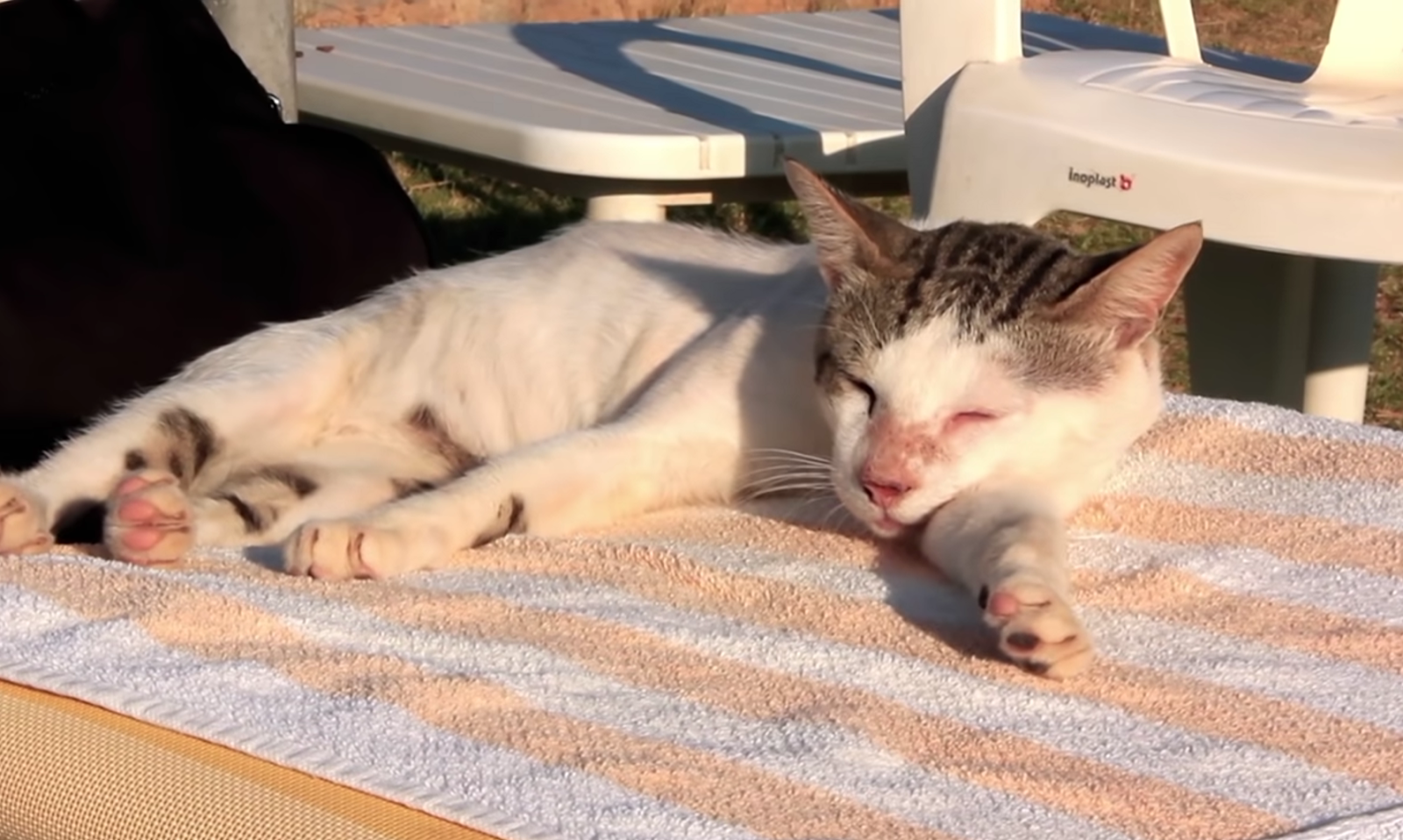Do Cats Get Sleepy When They Eat?
Cats often experience drowsiness after eating. This sleepiness results from their natural feeding and rest cycle.
Cats, much like many other animals, are prone to experiencing a bout of sleepiness following mealtime. This common behavior is linked to evolutionary patterns, where after hunting and consuming prey, a period of rest would naturally follow for safety and digestion.
Known for their tendency to sleep anywhere between 12-16 hours a day, cats are crepuscular creatures, meaning they are most active during the dawn and dusk hours. Feeding typically aligns with these peaks of activity, after which they retreat for a well-deserved nap. Such tendencies make understanding a cat’s sleep schedule important to caretakers. Carefully noting these post-meal snoozes can also provide insight into the overall well-being and habits of a cat, ensuring they maintain a healthy balance of rest and activity in their daily routines.
Cats’ Sleep Patterns
Cats are notorious for their love of sleep. Many cat owners wonder, do cats get sleepy after eating? It’s a curious question that leads us to dive into the fascinating sleep patterns of our feline friends. Cats’ sleep routines are both intriguing and adaptable. Let’s explore how these graceful creatures slip into dreamland.
Cats’ Natural Sleep Schedule
Felines are crepuscular, meaning they are most active during twilight. Their natural rhythm tells them to hunt at dawn and dusk. Here is what a cat’s natural sleep schedule looks like:
- Daytime: Cats catch quick naps.
- Evening & early morning: Peak activity for playing and hunting.
- Night: Energy levels drop, leading to more extended sleep periods.
Stages Of Sleep In Cats
Like humans, cats experience different sleep stages. These include:
- Light sleep: The cat is easily awakened.
- Deep sleep: This is the restorative stage of sleep.
- REM sleep: Where cats dream just like we do!
A cat’s sleep pattern alternates between these stages, often starting with a light snooze before diving deeper into dreams.
Factors That Affect Cats’ Sleep
Various elements influence a cat’s sleep routine. These factors include:
| Factor | Effect on Sleep |
| Age | Kittens and older cats sleep more. |
| Diet | Heavier meals can lead to sleepiness. |
| Health | Illness may increase sleep demand. |
| Environment | Comfort and safety promote better sleep. |
| Activity Levels | More active cats may need more rest. |
Knowing these patterns and factors can help cat owners ensure their pets get enough restful sleep. Observing your cat’s behavior after meals and throughout the day will provide better insight into their unique sleep needs.
Credit: www.rover.com
Eating Habits In Cats
Cat owners often wonder about their furry friends’ unique eating patterns. Cats, like all creatures, require food for energy and sustenance, but their feeding habits can have a curious effect on their behavior, sometimes making them appear sleepy or lethargic after a meal. Let’s delve into the fascinating world of feline eating habits and their impact on their energy levels.
Feeding Behavior In Cats
Cats are known for their grace and finesse when it comes to their feeding behavior. They are natural hunters and this is reflected in how they consume their meals. Rather than eating large portions at once, cats prefer several small meals throughout the day, which mimics their natural hunting cycles. This preference for frequent, small feedings can affect their energy levels, often leading to a calm and sleepy state after eating.
Frequency And Amount Of Food Consumed
- Small-sized Meals: Offering meals in small portions spread across the day aligns with a cat’s natural preference.
- Consistent Schedule: Maintaining a regular feeding schedule aids in keeping their energy levels stable.
- Monitor Intake: Observing a cat’s food intake is crucial to ensure they’re not overeating or under-eating.
Digestive Process In Cats
The digestive process in cats is quite efficient. Once the food is consumed, it’s broken down and nutrients are absorbed. This process requires energy, and as the body focuses on digestion, it can lead to a decrease in overall energy levels, making the cat want to rest and recuperate. This is often the reason why cats find a cozy spot to snooze after their meals. The quality of the diet also plays a significant role in how the body reacts post-meal.
| Meal Type | Body’s Reaction |
| High Protein | Quick Energy Release |
| High Fat | Slower, Sustained Energy |
| Carbohydrates | Variable Energy |
Balanced meals with adequate protein and fat ensure that cats get the right amount of energy without becoming overly sleepy. Pay attention to your cat’s behavior changes around meal times to better understand and accommodate their dietary needs.
Sleepiness After Meals
Sleepiness after Meals in cats is as common as it is adorable. Picture your feline companion snoozing blissfully, whiskers twitching post-dinner. But, what exactly leads to this drowsy state? Is it just a convenient time for a catnap, or is there more at play here? Let’s break it down and explore why your kitty might be keen to catch some z’s after chowing down on their favorite kibble or wet food.
Post-meal Sleepiness In Cats
Cats often feel sleepy after eating. They enter a state of contentment and relaxation. This is similar to the feeling humans experience after a good meal. In the wild, sleeping after a meal helps cats conserve energy. It also keeps them safe while they digest. Domestic cats have inherited this trait. It’s natural behavior.
Role Of Digestion In Sleepiness
| Digestion Phase | Impact on Cat’s Energy |
| Active Digestion | Energy goes to the stomach; the cat feels relaxed. |
| Resting Phase | The body focuses on nutrient absorption; sleep aids the process. |
When cats eat, their bodies prioritize digestion. Blood flows to the digestive tract. The brain triggers a hormone release. These hormones can cause sleepiness. Cats naturally respond by taking a break to sleep and recharge.
Energy Requirement And Utilization
- High-Energy Food: Protein-rich meals give cats a quick energy spike.
- Resting Period: Cats sleep to balance out this surge in energy.
- Stored Energy: Sleeping helps cats store energy for later activities.
Eating uses up a cat’s energy. It’s demanding on the body. After eating, cats rest to recover. This rest period is crucial for turning food into energy they can use later. A good nap means your cat will be ready for playtime or a hunting session later on.
Sleep And Digestion
Ever noticed how your furry feline friend seems to doze off shortly after a hearty meal? This isn’t mere coincidence. The relationship between sleep and digestion in cats is a fascinating dance of biology that affects their daily rhythm. It’s like their bodies have a natural ‘nap time’ triggered by meal times. Let’s dive deeper into this phenomenon with some insight into the digestion process in cats, how it ties up their energy, and how it leads to those sleepy moments post-feast.
Overview Of the Digestion Process
Digestion is a complex process where food is broken down into nutrients. These nutrients fuel your cat’s day-to-day activities and growth. Once your cat takes a bite, their body gets to work:
- Chewing breaks food into smaller pieces.
- Enzymes in the stomach further break down the food.
- Nutrient absorption happens in the intestines.
- Waste elimination sorts out unnecessary parts.
Energy Involved In Digestion
Breaking down food requires a lot of energy. Here’s a quick peek at what happens:
| Stage | Energy Use |
| Initial Breakdown | Moderate |
| Stomach Processing | High |
| Nutrient Absorption | Moderate |
| Waste Formation | Low |
With most of the body’s resources directed towards digestion, there’s less available for other activities, making your cat feel less energetic and sleepy.
Effect Of Digestion On Sleep
After eating, a cat’s body focuses on digestion, causing a decrease in overall alertness and promoting sleep. This is in part due to:
- A rise in blood sugar levels post-meal.
- The production of hormones like melatonin encourages sleep.
- An instinctive need to stay still and safe while digesting.
These factors combined make your cat instinctually seek out a cozy spot to rest and recharge.
Factors Influencing Sleepiness
Various elements play a role in the drowsiness of our feline friends after a meal. Understanding these factors can help us ensure our cats maintain a healthy sleep-wake cycle. Let’s delve into the particulars that dictate a cat’s need for those cozy catnaps.
Age And Health Of The Cat
A cat’s age and health significantly affect its sleep patterns.
- Kittens and senior cats often require more sleep.
- Health issues can also increase sleepiness.
Regular vet check-ups ensure a cat’s health doesn’t unduly impact its rest.
Type And Quality Of Food Consumed
The type and quality of a cat’s diet are vital for its sleep.
- High-carbohydrate diets may lead to more napping.
- Protein-rich foods can influence energy levels.
- Always opt for high-quality cat food.
Good nutrition supports a cat’s overall health and sleep quality.
Environmental Factors
External factors surrounding a cat can promote or hinder sleep.
| Factor | Impact on Sleep |
| Comfortable bedding | Encourages rest |
| Noise levels | High noise can disrupt sleep |
| Lighting | Darkness supports better sleep |
Create a tranquil environment to aid a cat’s sleep after eating.
Frequently Asked Questions For Do Cats Get Sleepy When They Eat?
Do Cats Feel Tired After Eating?
Cats often experience a state of drowsiness post-meal due to the energy directed towards digestion.
Can A Cat’s Diet Affect Sleepiness?
Yes, a diet high in carbohydrates or large meals can increase a cat’s tendency to become sleepy after eating.
Is Post-Meal Sleepiness Normal For Cats?
Post-meal sleepiness, also known as a food coma, is a normal behavior for cats and helps with digestion.
How Much Sleep Do Cats Need Daily?
Cats typically require 12-16 hours of sleep per day, with kittens and older cats needing more.
Conclusion
Understanding feline behavior reveals much about their sleep-eating relationship. Cats do indeed show signs of drowsiness after meals, due to natural biological responses. Cat owners need to monitor their pets’ diet and sleep patterns for overall health. Remember, a content cat is often a sleepy one post-dinner! Keep your furry friends healthy and in tune with their instincts.






